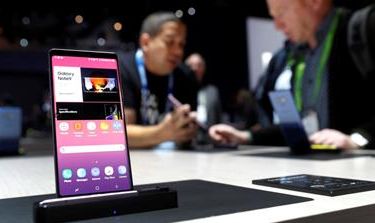South Korea seeks US help in export dispute with Japan
Seoul planning to allocate an extra $255m to deal with impact of Japanese electronic products export curbs.

South Korea‘s foreign minister told United States Secretary of State Mike Pompeo that Japan‘s export curbs against Seoul are “undesirable”, the foreign ministry said on Thursday, as a trade dispute between the East Asian neighbours grows.
South Korea’s ruling party also announced on Thursday that up to about 300 billion won ($254.8m) would be included in a supplementary budget bill to cope with Japan’s export curbs by speeding localisation of materials supplies for chips and display panels.
Keep reading
list of 4 itemsRare deep-sea squid filmed by scientists
Palestinian life under Israeli occupation: An illustrated guideThis article will be opened in a new browser window
Boeing’s jets turn 70: A timeline of highs, lows and turbulence
The ruling Democratic Party said about one-third of the proposed budget would be for supporting South Korean materials and equipment makers to commercialise their products.
Also on Thursday, S&P Global Rating’s Asia-Pacific chief economist Shaun Roache said the dispute was as unpredictable as the US-China trade war and was likely to affect South Korea’s economic growth.
Japan tightened curbs last week on exports of three materials crucial for smartphone displays and chips, saying trust with South Korea had been broken in a dispute with Seoul over South Koreans forced to work for Japanese firms during World War II.
The restrictions will affect companies such as Samsung Electronics Co Ltd and SK Hynix Inc, which supply chips to companies such as Apple Inc.
Clash at the WTO
South Korea and Japan clashed at the World Trade Organization (WTO) earlier this week and Seoul is stepping up diplomatic overtures to their mutual ally, the United States, to step in. However, experts said the US is unlikely to become a mediator in the dispute.
South Korean Foreign Minister Kang Kyung-wha told Pompeo in a phone call late on Wednesday that Japan’s trade restrictions may not only cause damage to South Korean companies but could also disrupt the global supply chain and hurt US firms.
Kang “expressed concern that this is undesirable in terms of friendly relations between South Korea and Japan and trilateral cooperation among South Korea, the US and Japan,” the ministry said. Seoul hoped Tokyo would withdraw the curbs and that the situation would not deteriorate further, it said.
Pompeo said he understood and both men agreed to continue to cooperate and to strengthen communication between the three sides, the Foreign Ministry said in a statement.
Kim Hyun-chong, deputy chief of South Korea’s National Security Office, arrived in Washington on Wednesday and told reporters he was there to meet officials from the White House and Congress to discuss issues that included Japan’s export curbs.
Doubt over mediation
A former Japanese ambassador to the US, Ichiro Fujisaki, told Reuters on Wednesday: “I don’t think we need the United States to mediate, just like Japan would not mediate US-Mexico ties or US-Canada relations.”
“This is an issue to be solved between Japan and South Korea,” Fujisaki said.
New US Assistant Secretary of State for East Asian and Pacific Affairs David Stilwell is visiting Asia until July 21, including stops in Japan and South Korea, to work on a shared vision for the Indo-Pacific region, the State Department said in a statement.
It did not say whether the Japan-South Korea dispute would be discussed.
Sheila Smith, senior fellow for Japan studies at the Council on Foreign Relations, said it may be too early for Stilwell to assess what the US could do to help.
“He is likely to begin with what I would call deep listening,” she said.
The dispute stems from Tokyo’s frustration at what it calls a lack of action by Seoul over a South Korean court ruling last October that ordered Nippon Steel to compensate former forced labourers.
Japan says the issue of forced labour was fully settled in 1965 when the neighbours restored diplomatic ties.
The neighbours share a bitter history dating to Japan’s colonisation of the Korean Peninsula from 1910 to 1945, which saw forced use of labour by Japanese companies and the use of comfort women, a euphemism for girls and women, many of them Korean, forced to work in its wartime brothels.
Shares in South Korean chip giants rose for a third day on Thursday on expectations that Japanese export curbs may ease a supply glut of South Korean memory chips.
At 0345 GMT, shares of Samsung Electronics gained 2.1 percent and SK Hynix was up three percent, outperforming the broader market’s 1.2 percent rise.